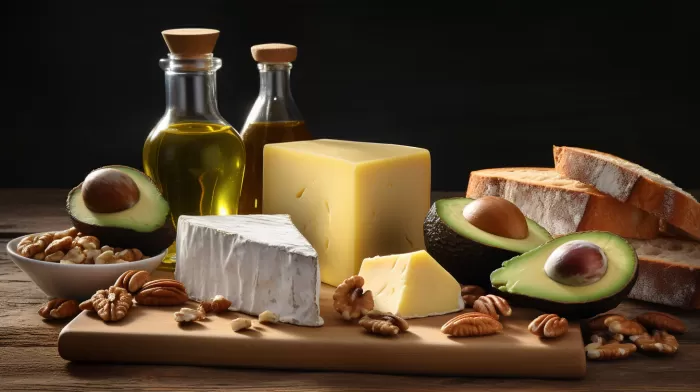While many people focus on reducing their fat intake, not all fats are detrimental to your health. In fact, cutting out all fats could even have negative consequences. In this article, we’ll delve into the different types of fats and their effects on our overall health.
Saturated Fats and Unsaturated Fats
Saturated fats refer to fatty acids that remain solid at room temperature. Generally, these fats can be found in high-fat dairy products like cheese, whole milk, cream, butter, and ice cream. Many people believe that consuming saturated fats will lead to higher cholesterol levels. While processed forms of these fats might, it’s important to remember that whole foods containing saturated fats can provide numerous health benefits.
On the other hand, unsaturated fats, such as polyunsaturated fats and monounsaturated fats, can be beneficial to your health if consumed in moderation.
Polyunsaturated Fats
Polyunsaturated fats can be extracted from safflower, soybean, sunflower, corn oils, and nuts. These fats can contribute to weight gain if consumed excessively. However, they also include essential Omega-3, Omega-6, and Omega-9 fatty acids.
Omega-3 Fatty Acids (linolenic acid, EPA, and DHA)
EPA and DHA are derived from linolenic acid, forming a family of healthy fats that promote anti-inflammatory effects throughout the body. Some excellent sources of Omega-3 fatty acids are flaxseed oil, English walnuts, and walnut oil. These acids have been found to reduce joint pain in rheumatoid arthritis patients, lower stroke risk, and inhibit cancer cell growth.
Monounsaturated Fats
You can find monounsaturated fats in foods like olive oil, nuts, seeds, and avocados. Don’t be deceived by their level of saturation, as this doesn’t necessarily determine their health benefits to the body.
Hydrogenated Fats
Hydrogenated fats are created when unsaturated fats are treated with heat or chemicals. This process gives the fat a firm consistency, such as the fat used in shortening, and extends the shelf life of products containing these fats, such as commercially baked and fried foods.
Trans Fats
Trans fatty acids are unsaturated fatty acids intentionally created by food manufacturers when oils are hydrogenated. The chemical alteration allows these fats to remain solid at room temperature. Research indicates that consumption of trans fats is associated with conditions like atherosclerosis and coronary heart disease.
The Importance of a Balanced Diet
In conclusion, whole foods and healthy fats should be an integral part of your diet. Consuming these foods can help promote a healthy heart, lower cholesterol, support healthier joints, boost brain function, and contribute to overall well-being. For a balanced diet, aim for 40% of your calories to come from carbohydrates, 30% from proteins, and 30% from fats.
While it’s essential to be aware of your fat consumption, it’s also crucial to understand that not all fats are harmful to your health. Maintain a balance by incorporating whole foods and healthy fats into your diet, and your body will thank you for it. Remember, moderation is key!



